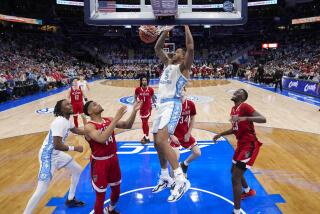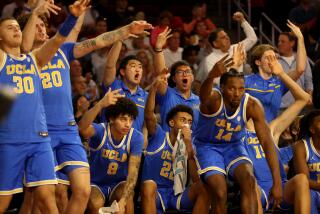Conference tournaments take their chances in Las Vegas
The last Big East basketball tournament as we know it hits New York’s stage this week at Madison Square Garden.
What sportswriter Dan Wetzel recently described as “the most honest event in college sports” is breaking up after a messy divorce that will separate Syracuse from Georgetown and Seton Hall from Rutgers.
That’s like breaking peanut butter up from jelly.
GRAPHIC: Pac-12 Conference Tournament Bracket
It’s all football’s fault, and what a money-grubbing shame.
It means that center court for amateur basketball has shifted west as the Pac-12 becomes the fourth conference to contest its tournament in Las Vegas.
Think of this in hypocritical NCAA terms as a drive-through marriage.
The drift from New York’s heart-and-soul to Nevada’s soulless Strip underscores and overscores the recent level of drivel dribbling out of NCAA headquarters.
There is nothing inherently wrong with conducting basketball tournaments in Las Vegas; Bugsy Siegel certainly would have approved.
The Pac-12’s move to Vegas makes dollars and sense after years of yawns and empty seats at Staples Center. What person, outside a monastic order, would not rather go to Las Vegas than downtown Los Angeles?
The Pac-12 comes to Vegas to find it already crawling with underage student-athletes from the West Coast, Mountain West and Western Athletic conferences.
The problem here is that the NCAA rails against gambling on one Texas hold ‘em poker hand and, on the other, uses Las Vegas as one of its automatic-bid hubs into the NCAA tournament.
The Pac-12 tournament is not merely contested in Las Vegas. The players are lodged at the MGM Grand and will play at the adjacent Grand Garden Arena.
One guy: “Pssst… Where’s the line for UCLA?”
Other guy: “Odds line or the ticket line?”
Las Vegas, aka Sin City, has never been allowed a sniff of an actual NCAA tournament game, and axis-of-evil Nevada is prohibited from hosting an NCAA championship event in any sport.
Staging four tournaments within a week of NCAA Selection Sunday, well, that’s somebody else’s problem.
“Conference tournaments are determined by the conference and its member schools, so I recommend you contact the conferences/schools to discuss,” NCAA spokesman Emily Potter responded in an email.
So there’s your moral distinction: League tournaments aren’t NCAA-sponsored events.
The crusader NCAA last October banned future championship events in New Jersey after the state passed a law legalizing sports gambling. The NCAA recently rescinded the ban only after the law was upheld in court.
Forgotten in this disconnect from reason is that the NCAA consists of institutions and conferences. Technically, they are one and the same.
The NCAA, mind you, has its reasons for taking a tough anti-gambling stand. College sports, particularly basketball, have been fertile ground for corruption.
A point-shaving scandal involving City College of New York rocked the sport in the early 1950s. In the late 1970s, Boston College was embroiled in scandal organized by mobster Henry Hill, the real-life character immortalized in the movie “Goodfellas.”
The Pac-12 is less than two decades removed from a basketball scandal at Arizona State.
So maybe there isn’t a present-day Pac-12 kid who would be tempted by the devil on his way from the MGM gift shop to his room. But what are the ground rules?
Did the Pac-12 have to ask the NCAA for permission to take its tournament to Las Vegas? Answer: No.
“In fact, when we were doing due diligence about where we were going to move the tournament, we checked with them,” Pac-12 Commissioner Larry Scott said. “I talked with commissioners from the other conferences to see what their experiences were like. Everyone has been very happy with it.”
Bylaw 10.3 in the NCAA rule book makes clear that student-athletes are not allowed to bet on sports, even though Pac-12 games are on the MGM’s betting board.
However, nothing is said about other games of chance, such as blackjack and poker.
“Student-athletes over the age of 21 are allowed to be on the casino floor and the conference does not limit their ability to gamble at the casino with the exception of the sports books,” Pac-12 spokesman Erik Hardenbergh said.
That means UCLA’s Wear twins, Travis and David, would not be in NCAA violation for doubling down in blackjack. However, UCLA’s Shabazz Muhammad, who is from Las Vegas, isn’t allowed to mention in a newspaper the name of his favorite Italian restaurant.
Hardenbergh said it will be left to the individual schools to address casino-access policies for this week’s tournament. “And we expect student-athletes to adhere to their team rules,” he said.
So there you have it. The NCAA will break your legal neck if your state tries to legalize sports gambling, but shooing underaged kids out of casinos this week is basically up to basketball coaches and hotel security.
UCLA, the Pac-12’s regular-season champion, isn’t taking any special precautions, according to Coach Ben Howland. “It’s the same-old, same-old for us,” he told Times beat reporter Chris Foster. “We structure our time. Our guys will not be running around the casino. We’re on a business trip.”
So no rules on gambling?
“If you’re 21, you can pull a lever,” Howland said. “If you’re not, you can’t.”
More to Read
Go beyond the scoreboard
Get the latest on L.A.'s teams in the daily Sports Report newsletter.
You may occasionally receive promotional content from the Los Angeles Times.











